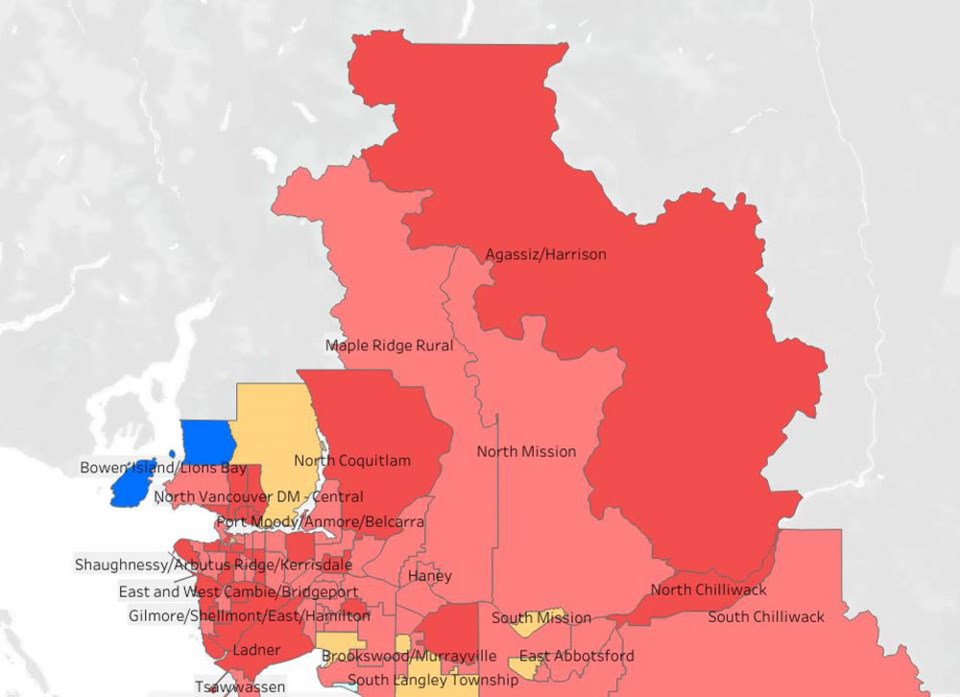The official COVID-19 case count in New Westminster has climbed slightly over last week, but test positivity is holding steady.
Between April 10 and 16, the city saw 22 new cases of COVID-19, up from 19 last week.
B.C. continues to face the effects of the sixth wave of COVID-19, driven by the Omicron BA.2 sub-variant. Provincewide, COVID hospitalizations are going up, but critical care admissions are holding steady. Local breakdowns aren't available for hospital admissions, so it's unknown how many of New Westminster's 22 new cases, if any, involve hospitalizations.
That number is not reflective of the actual number of COVID-19 cases in the city, since the vast majority of people have not been eligible for testing since the beginning of 2022, when case counts shot up dramatically in the face of the original Omicron wave. New Westminster's trend line, however, has been generally on a downward trajectory since January; by comparison, between Jan. 4 and 10, the city saw 303 new cases.
As of the latest data from the B.C. Centre for Disease Control, test positivity in New Westminster stood at 14%, the same as it's been for the past two reporting periods.
That 14% positivity rate keeps New Westminster on par with neighbouring areas of the Lower Mainland.
South of the river, North Delta stands at 11%, North Surrey at 12%, Guildford at 14% and Whalley at 17%.
Burnaby, meanwhile, has rates of 15% in the southwest quadrant, 16% in the northwest, 17% in the southeast and 25% in the northeast.
In the Tri-Cities, meanwhile, positivity rates vary widely by area: 17% in Southwest Coquitlam, 30% in Southeast Coquitlam, 29% in North Coquitlam and 16% in Port Moody/Anmore/Belcarra.
Who can get a COVID-19 PCR test in B.C.?
Testing for COVID-19 is available to those that meet the eligibility criteria.
According to the Fraser Health website (as of April 12), testing is recommended for people who have symptoms associated with COVID-19 infection and who meet one of the following criteria:
- people for whom testing is clinically indicated (people who are pregnant, hospitalized or moderately to severely immunocompromised).
- people with conditions that put them at high risk.
- people 70 years of age or older who are fully vaccinated, with three or more chronic conditions that increase the risk of severe illness or hospitalization.
- people 50 years of age and older who are unvaccinated or partially vaccinated and who have three or more chronic conditions that increase the risk of severe illness or hospitalization; or people 50 to 69 years of age who have not yet received their booster dose and have three or more chronic conditions that increase the risk of severe illness or hospitalization; or people age 70 years and older who have not yet received their booster dose and have one or more chronic conditions that increase the risk of severe illness or hospitalization.
- individuals who self-identify as Indigenous.
- individuals who live or work in high-risk settings.
Where can I get a COVID-19 rapid test in B.C.?
If you aren't eligible for public testing but you want to know if you have COVID-19, rapid antigen tests are available for free through participating community pharmacies for all adults aged 18+.
To find a New Westminster pickup point near you, check out this list by neighbourhood.
Students in kindergarten-to-Grade 12 schools around B.C. have also been given one five-test kit apiece through their schools.
The B.C. Centre for Disease Control is no longer collecting reports of positive cases from at-home tests.
Follow Julie MacLellan on Twitter @juliemaclellan.
Email Julie, [email protected].



